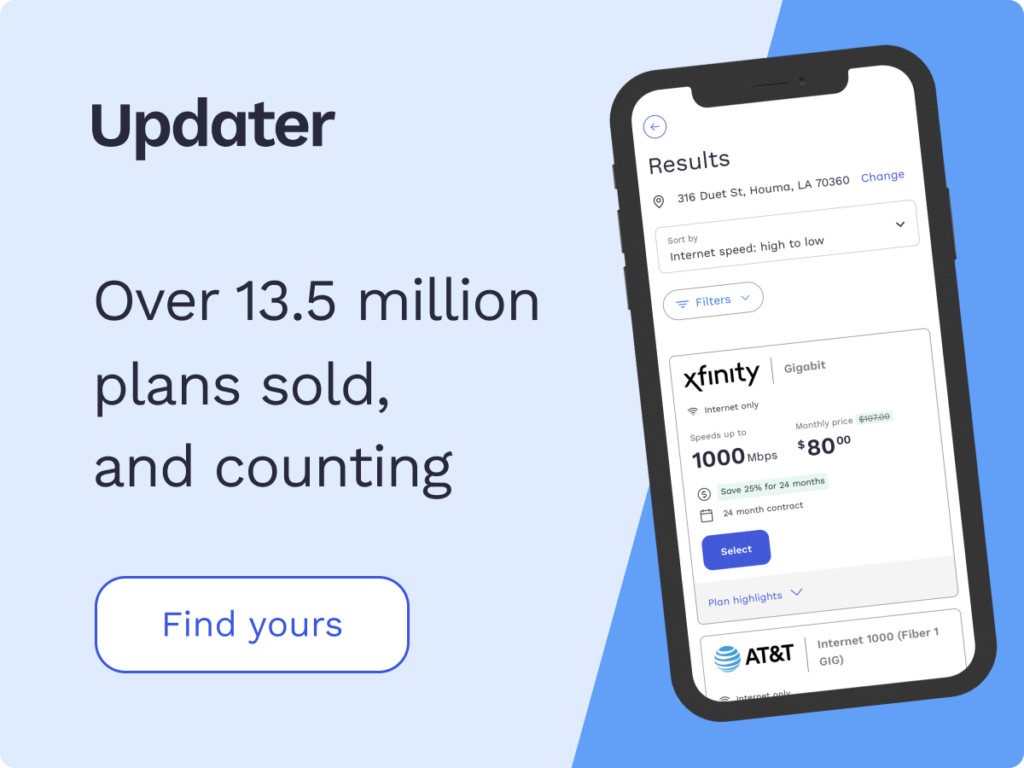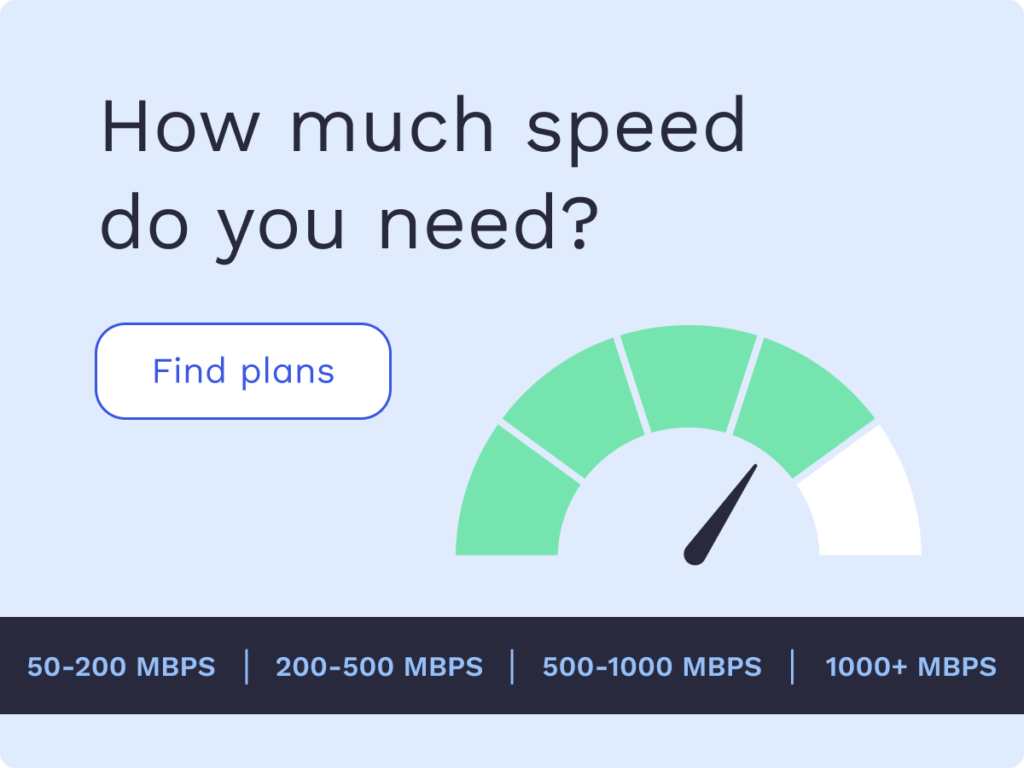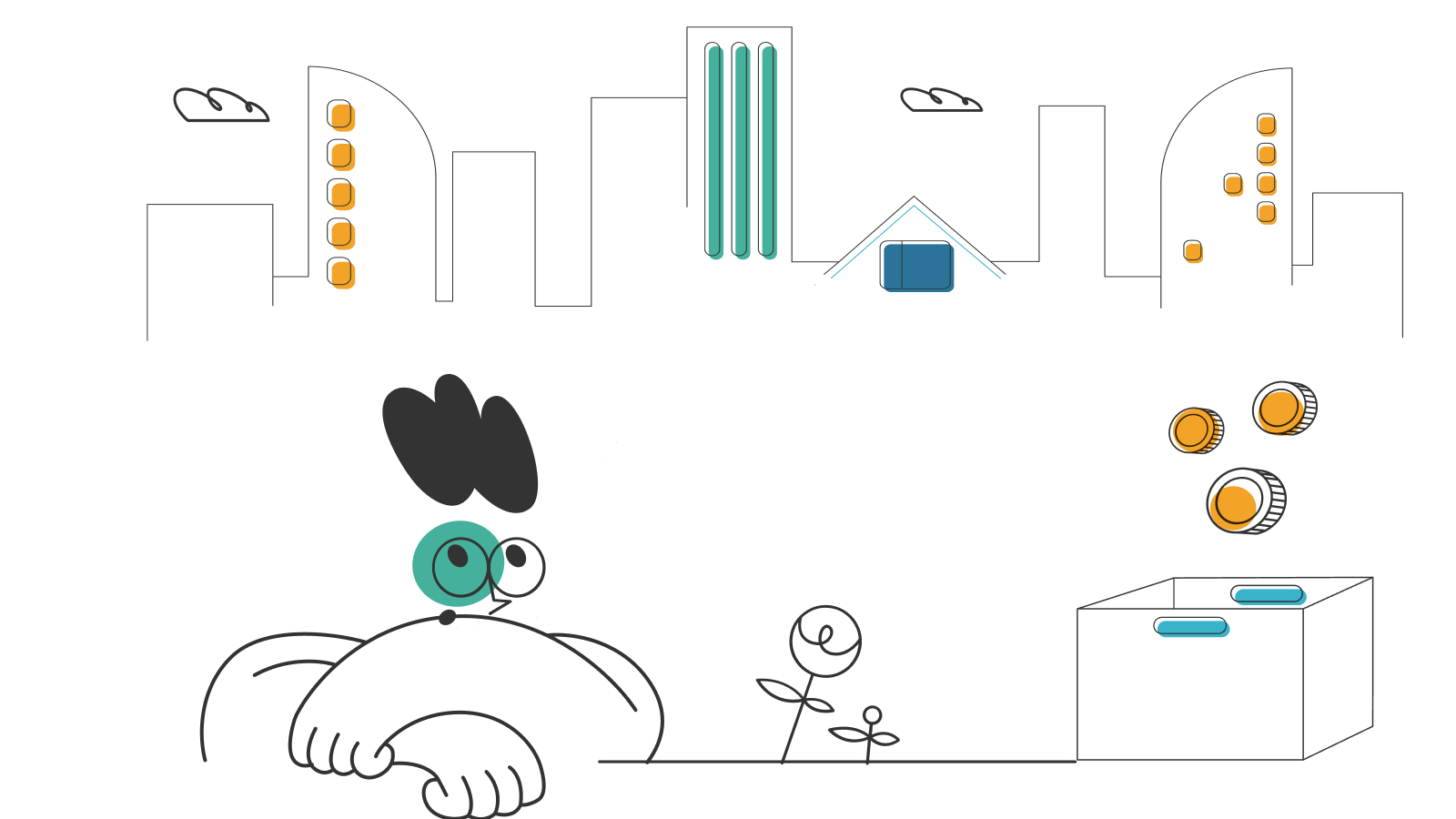A Guide for First Time Internet Buyers

When you’re in the market for an internet service provider (ISP), it can feel like there’s too much to choose from, and prices are all over the place. For first-time internet buyers, wading through the array of options can seem like a daunting task. Just choosing an ISP can be tricky as there are over 1,410 ISPs in the US alone.
One way to tackle this challenge is by working through your needs one step at a time. We’ve compiled this guide to help first-time internet buyers confidently navigate choosing an ISP.
Speed
When you choose your internet speed, you want to go with a plan that can accommodate your internet needs and provide enough broadband for higher-demand services.
20Mbps or lower
While this speed range might seem very low, it will allow smaller households to perform a myriad of internet-related functions comfortably. At this level, anyone with low-demand internet usage and one or two devices connected at the same time will be well-covered.
50Mbps
At this speed, small households with moderate streaming and gaming needs will have reliable connectivity. This speed works best for about three to five devices being used simultaneously.
100Mbps
This is a comfortable tier for households that need high-speed access to the internet for at least five devices. It supports gaming and high-definition streaming and can accommodate small offices with moderate internet demands.
1Gbps or more
High-speed internet demands coupled with multiple devices and high-definition content streaming should all fit comfortably in this internet speed range. This is a suitable choice for homes where multiple smart devices are connected, such as thermostats and appliances. Latency also tends to be quite low at this speed, which is great for gamers.
Type of internet
The type of internet you sign up for will largely depend on your needs and situation. For instance, if you have high internet demands, you might want to go for a fixed-line option. However, renters who don’t have DSL, cable, or fiber installed already may have to look into mobile internet.
Cable
Cable internet is readily available across a majority of the US. This is because many households still have access to cable TV and the coaxial cable for cable TV and cable internet is the same. With cable internet, maximum speeds can reach up to 1Gbps and cable is one of the most cost-effective internet connections. Customers can expect to pay just over $50/month for a 500Mbps plan, although pricing will vary depending on the ISP.
Digital subscriber line (DSL)
Similar to the connection cable internet has to cable TV, DSL internet has a connection to traditional phone lines. While a dial-up connection can be disrupted a telephone call, DSL lines can split these two functions. This means you can accept and make calls while browsing or shopping online. DSL costs are relatively low, so users can expect to pay around $60 for up to 100Mbps.
Satellite
If that cattle ranch out in the middle of nowhere appeals to you despite the lack of access to cable, DSL, or fiber internet, satellite might be your best option. Satellite internet provides connectivity to rural areas that may not have access to other types of internet. However, it’s essential to know that connectivity can be slow and only go as high as 100Mbps. For satellite internet speeds around 100Mbps, customers can expect to pay between $150 and $200/month.
Fiber
Fiber optic internet is known for its high speeds, currently maxing out at 5Gbps. However, most installations have a sweet spot of up to 1Gbps. As fiber internet infrastructure increases, the costs of installations are dropping, and users can expect to pay from $60 to $100 for a 1Gbps plan.
Mobile
Those who can’t install fiber, cable or DSL lines, such as renters or those who live a more nomadic lifestyle, may choose to opt for mobile internet. This is a pricey option, however, as mobile data averages around $3.39 per cellular gigabyte.
Choosing an ISP
Choosing an ISP is about more than running the numbers. You need to determine if it can serve your needs. It’s also worth knowing that not all ISPs, even the biggest, cover all parts of the US.
Location
When you’re new to an area, it’s essential to find out which ISPs are available to you. For instance, you may find yourself in a small town where the local ISP offers better support and coverage than a bigger provider. You should search for providers and read reviews to get a feel for what’s available.
Range of services
If you want more than just an ISP, for instance, a company that can also cover cable TV needs or home phone service, you can look for bundled deals. When comparing products, also compare prices to know whether it fits your budget.
Reputation
To learn about others’ experiences with ISPs, you can check out sites such the Better Business Bureau (BBB) or TrustPilot. You may uncover common threads in the customer comments that help you determine if a specific provider could be the right fit for you. Also, you can compare different ISPs to see whether the ratings match up to industry standards.
Alarm bells should ring when the following items are regularly mentioned in customer reviews:
- Poor customer service or support
- Hard to get in touch with and/or doesn’t respond to requests
- Regular issues with networking and connectivity
- Security-related issues
Equipment and hardware
Hardware can be a considerable expense, and it’s essential to know your options. Questions to ask yourself include:
- Can I buy my own hardware or do I have to rent it from the ISP?
- Do other suppliers provide the hardware or only the ISP?
- How much will the equipment cost?
- If the hardware is included in the plan, is there a fee if I cancel the contract within a specific time?
- Does the hardware meet your connectivity needs?
Duration of the contract
When you sign with an ISP, one of the most significant considerations is whether or not you’re locked into a contract. While some might not mind signing a contract, it can become a barrier if you need to relocate before the end of the contracted period. It can also be challenging to adjust your monthly spend if you need to manage your budget. If you need to remain flexible, you may want to try signing up for no contract or prepaid option that gives you month-to-month flexibility.
The cost of the package
While this shouldn’t be the only consideration, pricing is usually one of the first things you’d look out for when signing up with an ISP. You need to know your budget and speed requirements and should use those parameters to find the best plan for you.
Hardware options
When signing up for internet services, you’ll have several options for hardware. So, it’s important to understand your hardware needs upfront before signing with a new ISP.
Buying
Buying equipment like modems and/or routers might suit your needs if:
- You can afford to pay in full upfront instead of paying monthly rental fees. This option will likely work out to be much cheaper in the long run.
- You want to own the device outright, so it’s available to you even if you switch to another ISP.
- You’re not too concerned about upgrades.
Renting
Renting your internet equipment might be a better option if:
- You know you’ll want to upgrade regularly.
- You don’t want to pay a large sum upfront.
- You’re concerned about warranties and technical support.
Device type
There are many components that allow you to go online. These include:
- Modem – A device that allows you to connect to the internet.
- Router – A router connects to your modem and allows other devices to be able to use the internet.
- Modem and router combos – A single device that combines a modem and a router.
- Wi-Fi extenders – A device that extends the range of your router, especially useful for large or multilevel properties.
- Mesh network – A system consisting of multiple nodes that provide internet coverage to large areas.
- Satellite dish – A device to receive the signal from a satellite internet provider, usually installed on the exterior of a home.
Before deciding on hardware, you should ensure it supports your needs and that it meets the ISP’s minimum requirements. For instance, if you opt for a 1Gbps fiber connection, you’ll need a modem and networking setup that can accommodate that speed.
Cost
The cost of your device is determined by many things, such as the speed it can accommodate, whether it boasts the latest in technological advancements (such as DOCSIS 3.1, Wi-Fi 6E, etc.), and the number of devices you will need, such as extenders or mesh network nodes.
Other pricing considerations
Is your monthly rate affected by a promotional offer?
For instance, with some contracts, you may pay an introductory rate of $50/month for the first 24 months, with prices increasing after that time.
Does the contract cover the costs of installation?
If you agree to a contract, you may be able to get free installation, but only if you remain a client for a certain length of time, such as 12 or 24 months.
Are there extra subscriptions or fees?
Some extra taxes and fees are unavoidable, but you may be able to eliminate others and reduce your monthly bill. For example, your ISP may charge extra for a higher data cap that you don’t need.
Would bundling save you money?
Some ISPs offer cost-effective bundle deals that include TV and phone services. These types of bundles may be a good choice if you’ll use all the included services regularly.
The best way to find the most reasonable pricing for internet service is to request quotes from several ISPs and compare them. It’s also worth doing the math to ensure that time-based promotions will still be affordable when the contract changes to standard pricing.
Also, if you’re considering a bundled option, you should price out products individually to ensure that you’re saving. For instance, you might be interested in a bundled plan for $120/month that includes internet and a TV streaming service. That means those products individually would need to cost more than $120/month for the bundle to be worth your while.
*Pricing varies by location and availability. Speeds may vary. All prices subject to change; for current pricing and availability visit our internet service page. Prices as of 5/24/22.
Disclosure | Updater articles are based on our own data and research, independent from partner relationships. We are not compensated by partners for information and opinions presented here. Our Editorial Terms of Service can be found here.














